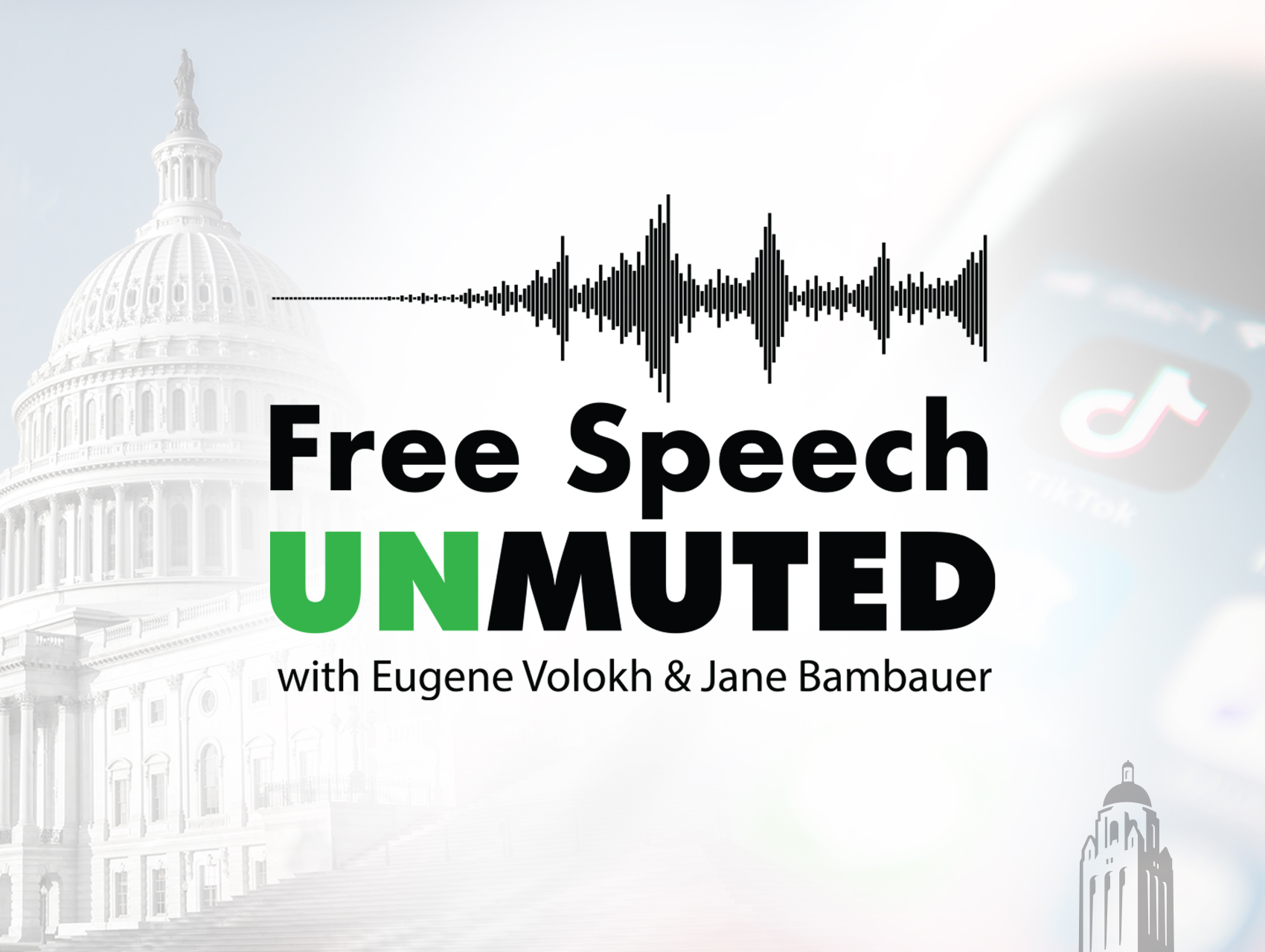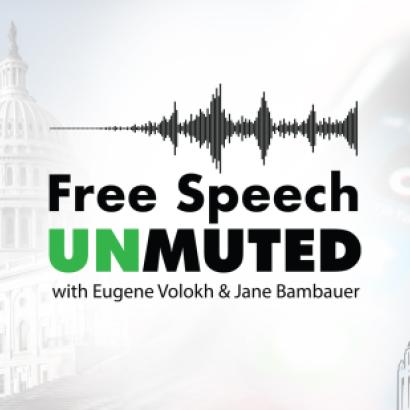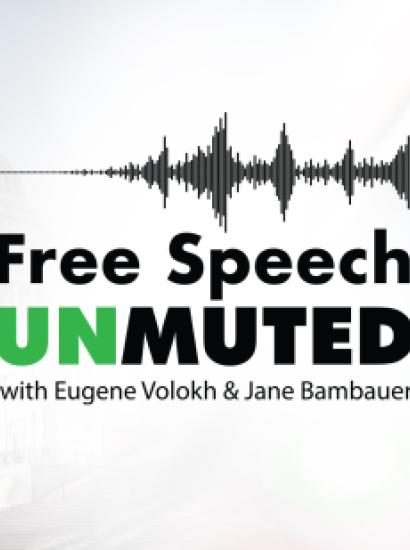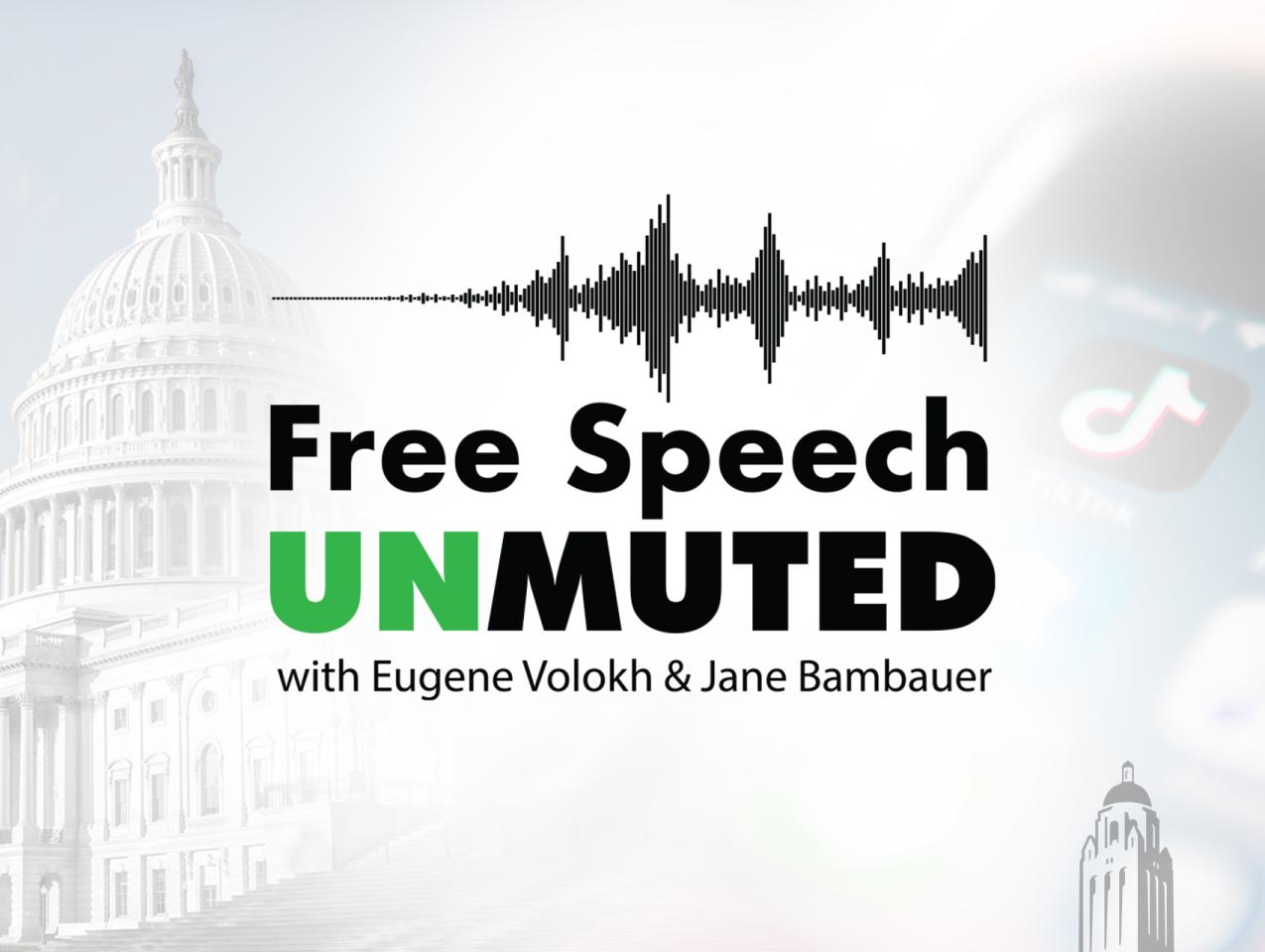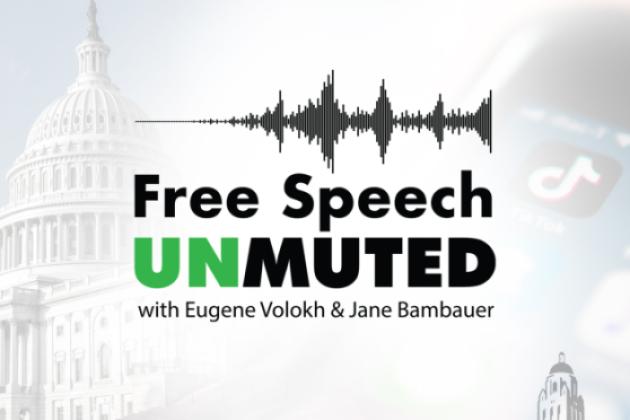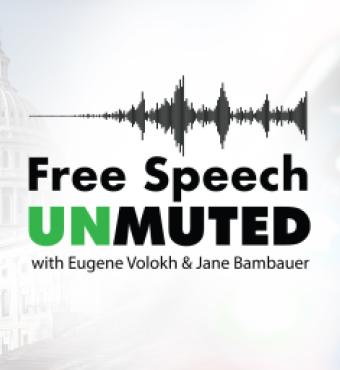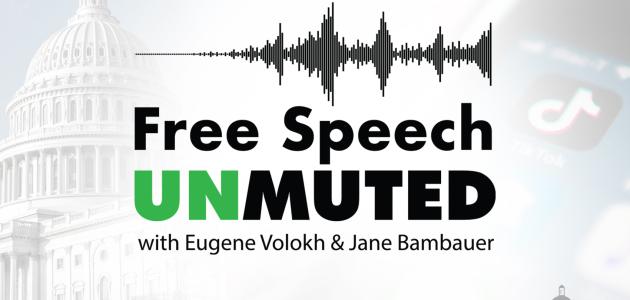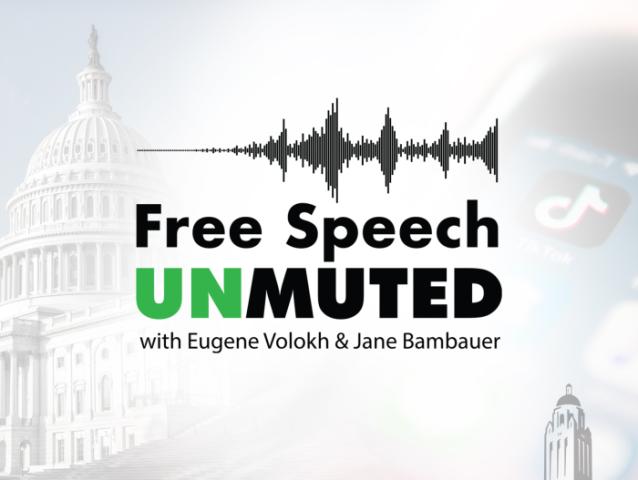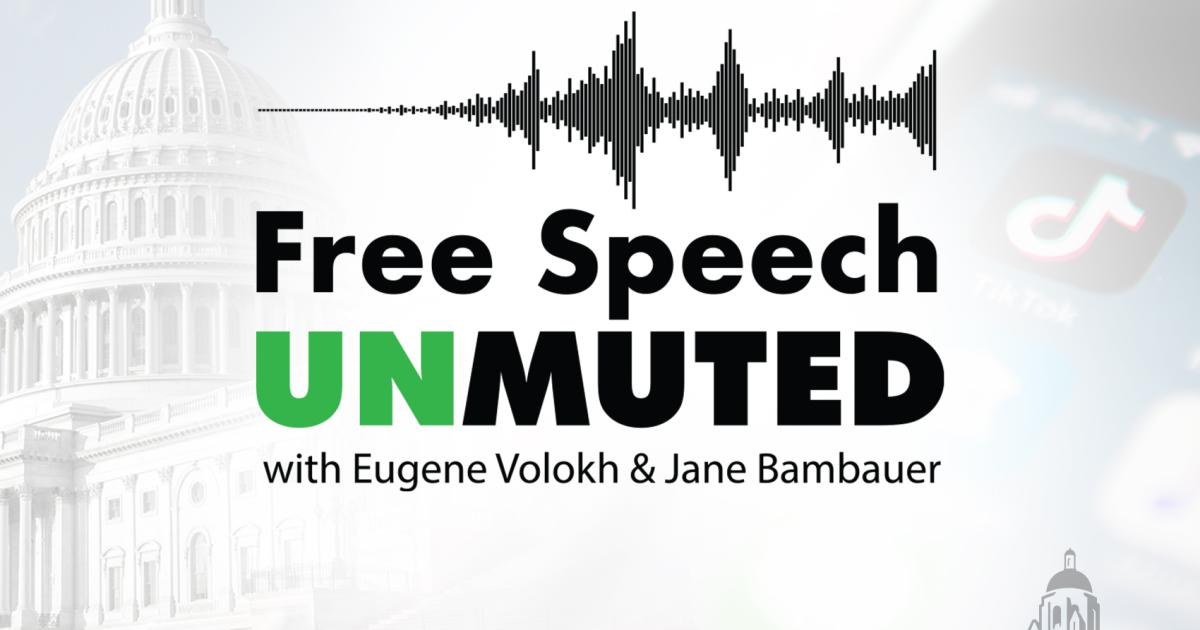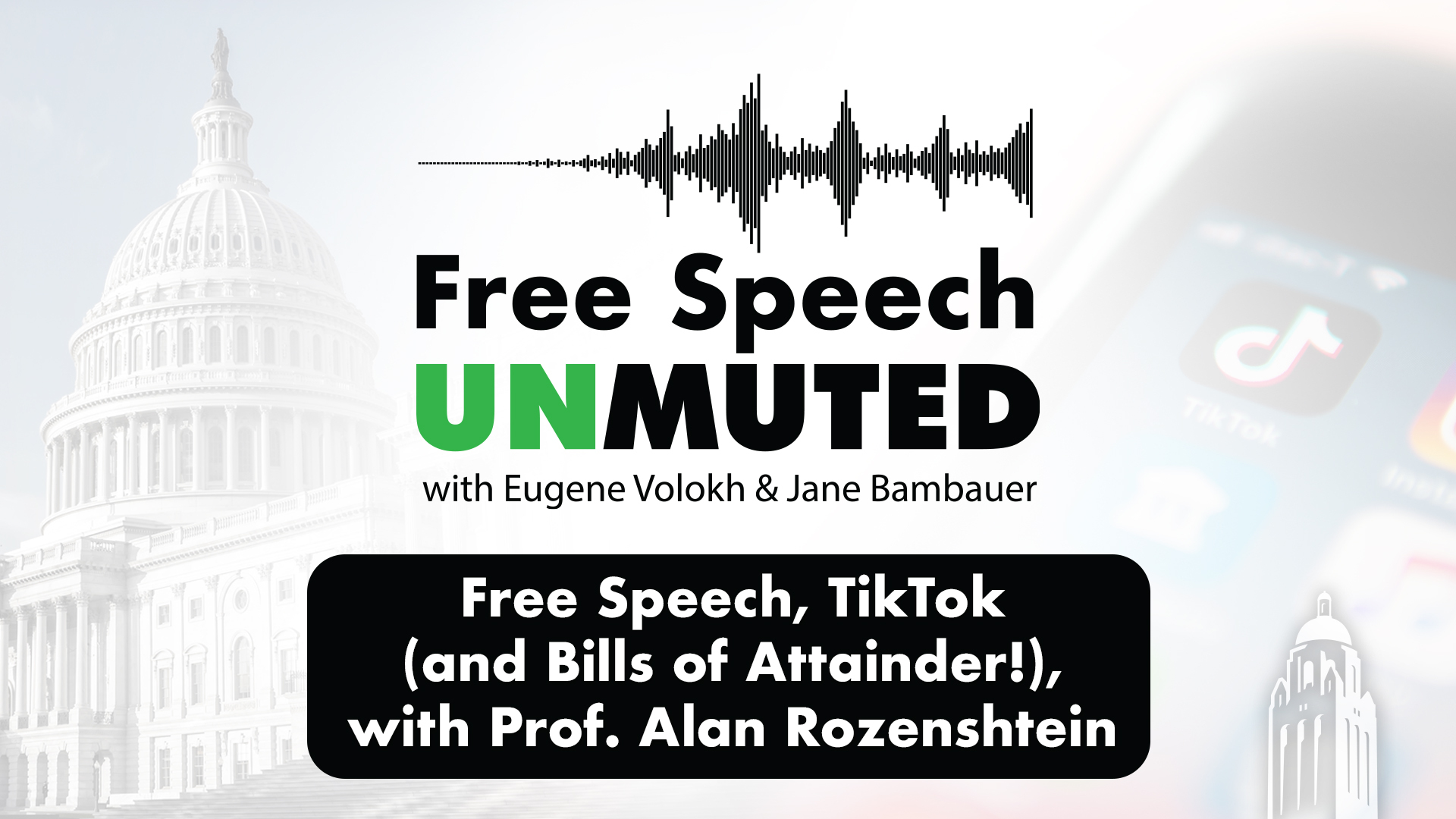- Law & Policy
- Telecommunications & Internet
- Revitalizing American Institutions
Can Congress require China-based ByteDance to divest itself of TikTok as a condition for TikTok continuing to be easily accessible in the US? Alan Rozenshtein, Jane Bambauer, and Eugene Volokh discuss whether the law is consistent with the First Amendment – and with the much more rarely talked about Bill of Attainder Clause.
To view the full transcript of this episode, read below:
Free Speech Unmuted
Eugene Volokh: Hello, welcome to Free Speech Unmuted from the Hoover Institution. I'm your co host Eugene Volokh, now basically emeritus from UCLA Law School and a senior fellow at the Hoover Institution.
Jane Bambauer: I'm Jane Bamberger, the Breckner Eminent Scholar and Professor of Law at University of Florida. And today we have with us Alan Rozenshtein.
So Alan, tell us, tell us about yourself and correct my pronunciation of your name if I just butchered it.
Alan Rozenshtein: Sure. it's Rozenshtein, but I, don't, I don't, wait,
Eugene Volokh: wait, a minute. You, spell it
Alan Rozenshtein: Rozenshtein. I can't, I, I cannot, I am not responsible for my parents immigration choices.
Eugene Volokh: Exactly. So Alan and I. are both of Russian Jewish extraction. I was actually born in Kiev and it came here when I was, seven. Alan's parents are from, from Russia. I don't know the former Soviet union, but he was born very [00:01:00] shortly after they came. So there is always this question of how you, how you transliterate the relic names into something that Americans can pronounce.
And I, I'm not sure either of our parents did a great job with that. mu much as we love them on this particular point, they may have aired.
Alan Rozenshtein: it's funny because both of our names have these silent Hs and I like to joke that there's a STL somewhere that's missing an H. There you go. Found its way into my name.
It's s.
Eugene Volokh: But I'm sorry to have interrupted, Alan, tell us about yourself.
Alan Rozenshtein: Sure. I'm an associate professor of law at the University of Minnesota where I've taught now for seven years. And I am also a senior editor at Lawfare where I do a lot of my writing on the sorts of topics that we're going to talk about today.
and before that, I was a, attorney at the Department of Justice in the law and policy section of the National Security Division.
Jane Bambauer: Yeah, so we're here today to talk about the tick tock ban or so called tick tock [00:02:00] ban it will see what, whether it actually, you know what its future actually has in store.
But can you tell us a little bit about the law that was passed by Congress and signed by President Biden and then. We'll figure out what the free speech issues are.
Alan Rozenshtein: Sure. So the law and, this is actually one of these, cases where Congress did not use a backer name for some reason, it's the protect Americans from foreign adversary controlled applications act.
So it's perfect.
Jane Bambauer: Yeah. Which is,
Alan Rozenshtein: which is not great. which is not great. So we're just going to tell, I'm going to call it the tick talk law. so this was a law that was introduced in the house as part of the, bipartisan select committee on China, sailed through the house, a few months ago, surprising a lot of people how quickly it went through.
It seemed to stall in the Senate for a while, but then for a number of reasons, including some changes made to the [00:03:00] law and then the broader, foreign aid package that went through. To assistance to Ukraine, Israel in particular, this was, signed or enacted by Congress and signed the law by the president.
I think late last month, and the law, is sometimes called a, it's called by its supporters as a divestment law, it's called by its opponents as a ban law. Basically what it does is it requires bite dance. The Chinese company that owns approximately 20 percent of TikTok to, divest itself of TikTok.
And if it doesn't do so within a little less than a year. TikTok is banned now. What band means is a little complicated. really what it is that, the law actually applies to, app stores and in particular, internet providers. They're not allowed to, Host tiktok services, so it doesn't actually make for consumers using tiktok illegal or anything.
But given that the vast, majority of people just want to use a, [00:04:00] social media platform without too much, fuss, once the app stores stop carrying updated versions of tiktok. And once it gets, hard to use tiktok through the website, through your internet service provider, the assumption is that tiktok will be for the vast majority of people effectively banned.
Jane Bambauer: Yeah. Okay. so you've written on Lawfare about the First Amendment implications and I understand you're going to have another post coming out soon. We'll link to both of those. But what do you make of this? how would you apply First Amendment jurisprudence to this particular law?
Alan Rozenshtein: Yeah, no, it's an interesting question.
And to be honest, I, it's funny. I, I, have never thought of myself as a first amendment scholar, though, in the last year or two, just given how much time I spend thinking about all things internet related, I feel like I've become one. But really, I think of you two as far more expert in this than I am.
So I have my own ideas, but I'm actually very curious This is what you two with kind of a much longer history of thinking about the First Amendment think, so [00:05:00] I think of myself as in the minority of scholars, not a tiny minority, but I think a minority of scholars who think that although the First Amendment arguments that TikTok and TikTok users will be making, against this law, although the arguments are strong, that ultimately the government actually has a pretty good Case and I think more likely than not that the first amendment that the government will ultimately prevail You know at the end of the day and here I'll cheat a little bit in answering your question Jane because When one traditionally starts a first minute analysis the most important thing to do once one has decided that The first time it actually applies so that this is First Amendment protected activity.
And I think here there's general agreement that the first time it definitely is implicated is one has to figure out what the appropriate quote unquote tier of scrutiny is. is this a prior restraint, which is the highest level of review? Is it [00:06:00] a viewpoint based? Law. Is it a content based law?
Is it a content neutral law? In which case, it's not strict scrutiny, but intermediate scrutiny. And then all these gradations in between, and again, it's something that you two who are real first known scholars know one can spend infinite brain cycles thinking about this. And I think one thing that's interesting about this law is that I think they're actually plausible arguments for all of those positions.
I think you can argue that it's a prior restraint, that it's viewpoint based, that it's content based, that it's content neutral. I think part of that is because this is a, I think a pretty novel fact pattern, at least in First Amendment jurisprudence. I think it's also the fact that the tiers of scrutiny analysis has never been, I think, particularly clear.
And when I said I'm gonna cheat in your answer a little bit, what I meant is that I think at the end of the day it doesn't matter all that much. Which is to say, at the end of the day, the vast majority of First Amendment cases come down to some sort of balancing of the various interests at stake.
And this is particularly true at the Supreme [00:07:00] Court, where, you really, I'll be a little bit of a legal realist here. It's really all about can you count to five justices that will agree that your side's values are more important than the other side's values. and that although the tiers of scrutiny do real work in that they, function as kind of presumptions, if the court concludes that such and such is a prior restraint, then presumptively the government's going to have a big problem, though sometimes prior restraints are fine.
Similarly, if the court concludes that this is merely a neutral time, place, and manner restriction, presumptively the government's probably going to be okay, though those are also struck down all the time. At the end of the day, a lot relies again, especially in really high profile, sui generous cases like this on the specific facts.
in my writing on this, I have tried not to, and again, I'm happy to get pushback, from, you too. I have tried not to spend too many cycles worrying about exactly what level of scrutiny should apply here. And instead, just [00:08:00] try to outline what are the values on each side? What are the values The First Amendment interests of TikTok, and I think more importantly, the 150 million American users of TikTok on the one hand.
Versus on the other hand, what are the government's interests here in potentially banning TikTok, or at least really risking a ban of TikTok? and there are two in particular. One is a data privacy concern, because in the course of personalizing the TikTok algorithm for users, TikTok collects an enormous amount of information on what it is that you are watching and clicking and liking and disliking.
and TikTok and therefore ByteDance and therefore the Chinese Communist Party could potentially use that information to America's detriment. So that's the data privacy concern. And the other concern is a foreign manipulation concern. That, because TikTok is You know, entirely run by the algorithm is totally inscrutable.
if [00:09:00] a foreign entity can influence that algorithm, they can influence the information ecosystem of 150 million Americans and not just 150 million Americans, but because of TikTok, because TikTok is so popular among young people. And for those young people, TikTok is not just a source of fun cat videos, but it's actually the main source of news that they get.
one can imagine, just generally, or especially in a conflict, let's say over Taiwan, that TikTok could suddenly become a, profound, Vector of foreign influence and foreign manipulation. And so I think ultimately comes down to balancing those two.
Jane Bambauer: Yeah. Okay. So before we go into the values and the sort of government interest, I do want to pause and Talk through the coverage or maybe levels of scrutiny issue because I'm actually not sure and I really regret to say this because as a policy matter.
I have some major issues with the tick tock [00:10:00] band, but I'm not sure that actually the First Amendment would even apply. I'm curious to hear Eugene's thoughts as well. But here's, my thinking. I guess there are two reasons to doubt that we have to do a First Amendment analysis. One is that maybe you could conceive of this as really a trade restriction, that has obvious, free, speech, results, and, maybe even speech related, content based related, even viewpoint based related maybe motivations, but that ultimately still it's a Restriction on managing, trade and so the way, much, much the way that we, don't allow certain other types of, products or services, to, pass through the borders.
Another reason though that I have some skepticism is because the Supreme Court in cases that are somewhat old, but, they've suggested that [00:11:00] even when the government's goal basically is to restrict information that comes from outside the borders in. They have wide latitude and, these cases don't seem to really apply a constitutional analysis.
So the two cases I have in mind, first, the earliest was Zemel versus Rusk, which is a little different because this is the case that involves, a set of plaintiffs who wanted to travel to, to, Cuba in the sixties. And they alleged, and no one disagreed, that they wanted to go there in order to gather information and an understanding of what's happening in Cuba.
And, the Supreme Court went out of its way, not only to say that the government has full authority to decide who can leave the country, but, but also the Supreme Court said that the right to speak and publish does not carry with it unrestrained right to gather information. A lot has happened since that case.
And I think the Supreme Court has over time [00:12:00] recognized the right to gather information. but. the board, if you combine that logic with the logic of the whole state control of the borders. you can see where I'm going here. And then the second case, was, Kleindienst versus Mandel. Yeah. yeah.
So this one I think is even closer analogy. that one, I know. Yeah. Yeah. And so this one involved, this is a little later in the seventies. It's still a long, long ago though. And it involved, an invitation offered by Stanford University to a Belgian revolutionary Marxist as he himself portrayed.
Yeah. Yeah. his own work, who, applied for a visa to come to campus and give a speech and the, customs office said no. And although there were a couple of dissenting, justices, the Supreme Court decided there is, basically that the government has full control over, over these decisions, irrespective of the reasons, the [00:13:00] speech related reasons that they may be made.
Eugene, do you, what, do you make of. Just this application question, the coverage question.
Eugene Volokh: so I'd love to hear what Alan has to say about those cases. But I'd also add a third one, which is Lamont v. Postmaster General, which specifically involved the travel not of people, but of information.
And that was actually, it was 1965, the first Federal statute ever struck down by the Supreme Court on First Amendment grounds. Of course, the Supreme Court has the power to strike down Lamont. It's true. It has the power to strike down federal statutes and often exercises it. In fact, The whole point of the First Amendment originally was to constrain Congress, that's it starts with Congress shall make no law, but it took a long time before the court actually said this federal statute, not a state statute, not a federal executive action, but this federal statute is unconstitutional, happened in 1965.
The statute, [00:14:00] basically required Americans who wanted to receive foreign communist propaganda to go to the post office. maybe not the post office, but in any case, go to the government and say, I am willing to receive it by the mail. And it made it illegal to send and deliver it to them, unless they have actually specifically, specifically requested.
and the Supreme Court did not decide the question whether foreign. Foreigners, and especially foreign governments, have any First Amendment rights. It didn't focus on the rights of the senders, but it did talk about the rights of the recipients and, concluded that this law was unconstitutional because it interfered with the rights of Americans to receive this information.
And so it did not view, federal governments had undoubted power to control what comes into the country, [00:15:00] as A total as being unlimited or put, more positively concluded that even Congress's broad power to, control what goes into the country is limited by the first two. So those are the three cases that strike me as most, most relevant.
Although Alan, I totally agree with you that in many ways, this is sui generis and part of the problem is the Supreme Court has never really confronted a question quite like this one. even Lamont, which I do think is. Some respects close. This is a mailings of foreign propaganda to Americans.
How many Americans would likely, even if they didn't have to put their name down on a list, would have been particularly interested in reading that? Very few. Tick tock very many. so, it's an interesting, I'm not saying any of these cases are strictly binding here, but I'd love to hear what you think about how these cases play out.
Alan Rozenshtein: Yeah. so a lot there. So let me say a couple of things. So first, and [00:16:00] this is not dispositive, but it's something all the, all of the courts to have all of the courts who have heard cases like the one that is about to be heard in the DC circuit, because this is not the first attempt to ban tick tock.
There was, I think Montana. some Midwestern state. I think it was Montana tried to remove Wyoming, tried to ban it. And then, of course, in the Trump administration, Trump through executive order, tried to ban it in litigation there. everyone seemed to concede. And certainly the courts assumed that there was a first amendment issue here again.
That doesn't mean that there necessarily is. But I think that's one data point. The second point I would say is, just to get back to Lamont, because I think Lamont is a very important issue. Case I reread it this morning because I needed to for this law for peace that I'm writing and what you described Eugene as the holding of Lamont, which is that Americans have a right to receive foreign propaganda, which is how Lamont is generally understood.
I'm actually not sure. That's what Lamont says. That's what Justice Brennan's concurrent says in Lamont. But Justice Douglas is very short and in [00:17:00] true Justice Douglas fashion, extremely under argued and under theorized opinion really actually focuses on, the, the chilling effect of having to go to the government and say, Yes, I would like to receive the peaking review.
And that was coincidentally, the, propaganda at issue. So it's another Chinese propaganda case. but we should get back to Lamont. I think Lamont is an interesting case.
Jane Bambauer: Yeah, that, and that, yeah, that, that makes sense. And Brennan is consistent because he also dissented in that client and in the, case involving the Belgian.
Yeah.
Alan Rozenshtein: Yeah, I think, Kleindienst is very interesting, and again, it's, hard to know what exactly to make of that, what I, whatever Kleindienst stands for, the reason I don't think that it would really apply here is, it'd be one thing if the government From a blank slate said, or, let me give you a more specific example.
It's one thing if a [00:18:00] Chinese company wanted to buy a us platform and the government, and here would be SIFI as the committee on foreign investment in the United States said, no, you can't do this. And in fact, CFIUS has done this, when a Chinese company tried to buy Grindr, which is a dating service, very popular with gay and lesbian Americans.
CFIUS said, no, you can't do this because we don't want the Chinese government to have access to the HIV status of Americans. Cause that's something that Grindr allowed people to put in. that I think is different than you have an existing platform where 150 million users are every day doing things that have profound first amendment implications.
And we are now going to ban this platform. I think that's quite different then. There's something outside the United States. And then the question is, can it come into the United States? Something you already have in the United States. Now, to, to your point, Jane, I think the fact that the government generally has broad national security, foreign relations, economic trade, however you want to think of it, powers, is a really important part of the First [00:19:00] Amendment analysis.
But I think that, the kind of brute fact that you have 150 million Americans using TikTok every day is going to make it very difficult, I think, for any court, even if they ultimately uphold the law, which I think they will, to say there's no First Amendment issue here.
Jane Bambauer: Yeah, I hope you're right, but it is one of those things that where, there's probably all sorts of ways in which our national security or customs and border enforcement, keep us from knowing what we'd actually like to know and we're just And so the being, joining you on the realist side a little bit I, you're probably right but if we knew more about what we're missing from certain policies, maybe that same logic should apply to cases that the Supreme Court, The thought where you're, unrelated to the first moment.
So
Eugene Volokh: I do want to, I do want to also stand by a little bit my characterization of a Lamonti Postmaster General. I think even in Justice, Douglas's [00:20:00] majority opinion for the court, he talks about how the requirement that the addressee must request in writing that it be delivered Is, quote, an unconstitutional abridgment of the addressee's First Amendment rights.
Close quote. Sounds like in context, what he's saying is That the addressee has a First Amendment right to receive information and, that, by saying in order to get the information, you've got to do something that will put you on a list of people who are interested in foreign communists, but again, that which is a list most people might not have wanted to be on.
the, the concern there is that, it burdens your ability to receive that information. It imposes a barrier to your First Amendment rights as a listener. But in any case, whether it's Justice Douglas or Justice Brennan's quite influential concurrence that you're [00:21:00] quite right, has gotten a lot of traction since then.
I do think in many ways, Structurally it is quite similar because here the concern is also that TikTok users have an interest in using this app and receiving the information on it, although many of them are also TikTok content creators, so they have an interest in being able to use it to distribute their speech.
So I'm totally with you that there's a Pretty substantial burden on people's ability to speak and to listen for sure. But also again just returning to your sui generis point You might say that what was true of this relatively minor form a potential form of foreign influence in the form of mailings of the peking review or similar publications from overseas may not be really relevant to a situation where we've got something that's being used by so many, Americans and so many young Americans.
Alan Rozenshtein: [00:22:00] Yeah. And I, think it's part, partially what you just said, right? It's a scale issue, but I think it's partially also a transparency issue. So I think one thing that's important about this, ban is that it does not prevent Chinese propaganda. I can go today and I link from this from lawfare.
So I the peaking review is interesting. It is, China's only English language state on newspaper. and it you can click on. It's called the Beijing review today. It still operates. it says exactly what you would think it would say. and you can access it and you can access it today. You can access it after the law goes into effect.
Similarly, if you want to go and, you want to hear what, The China Ministry of Foreign Affairs wants to say you can go and hop on Twitter and read their Twitter account and you'll be able to do after this bill goes into effect as well. So it's not a ban on Chinese propaganda per se, or I think even at all.
It's a ban on Chinese control over an information environment. Now why is that different? [00:23:00] if you dig into the justifications, so let's, say that we interpret Lamont Through the Brennan concurrence, right? and, we just say, okay, Lamont stands for some general proposition that Americans have a right to foreign propaganda.
Why? I think the, best argument is there's like a marketplace of ideas. argument that foreign propaganda is information like anything else and it should be part of the flow and One person's propaganda is another person's truth And even if it's bad it helps sharpen our understanding all the standard marketplace of ideas arguments that i'm totally happy with but one difference I think between foreign propaganda and foreign control over a platform is foreign propaganda is usually at least Pretty clearly foreign propaganda when you're reading, or at least it's foreign when you're reading the Beijing review, you're reading the Beijing review.
You know what you're reading. and I think that helps contextualize what you're reading. You can agree with it, disagree with it when you're on tick tock. The whole point is that this algorithm is totally unscrutable. You have [00:24:00] no idea why you are seeing what you are seeing and the potential for subconscious manipulation, that I don't think, furthers the marketplace of ideas.
in the same way that being able to read the Peking Review does. I think that's another really big difference. Now, we could spend all day talking about it, but maybe even, subconscious propaganda still has information and stuff like that. But I think at the very least from a doctrinal matter, it's pretty clear that this distinguishes Lamont and, I emphasize this because I've heard a lot of critics of this law cite Lamont as if it straightforwardly disposes of this case because Lamont stands for some super broad proposition about foreign propaganda.
And, what I would say is I don't think the case does. And I also don't think that. The historical context does either. Matt Iglesias, the, well known blogger, had a nice piece a couple months ago, why he is, was for the ban. And he's not a lawyer, so his is more of a policy analysis, but he made a very nice analogy.
And he said, look, imagine during the height of the Cold [00:25:00] War, the Soviet Union wanted to go and buy CBS. Would we have allowed that? And the answer is no, we would not have allowed that. And it is, I think, inconceivable that the Supreme Court would have had problems with that. it, it strikes me as very unlikely.
Again, this is not a legal point. This is a historical sociological point that even the court that I think unanimously, struck down that law in Lamont in 1965 would have, three years after the Cuban Missile Crisis, been okay with the Soviet Union buying CBS. Because I think there is really a distinction and it's not just one of degree.
it's one of kind.
Eugene Volokh: so first of all, I'm sorry, you're quite right that, the, court, the court, was unanimous in the case. I was mistaken, talking about dissent. I'm sorry. I should have said that the government's position, in Lamont postmaster general, but the second thing I wanted to say, is that, you, raise this question of buying, broadcasters and indeed, [00:26:00] there are to this day.
Limits, substantial limits on foreign ownership of, of, broadcasters, presumptive limits. they could be, as I understand it, waived by the FCC, but there are such limits. what do you think of that as a precedent, do you think? the Supreme Court, to my knowledge, has never really squarely confronted them.
But the broad assumption is that they are, they're valid. Is it something that's just a broadcasting only rule? Because there are a lot of. Supreme Court cases that say, broadcasting is special, or is it something that you think stands for a broader proposition and the other thing? actually, I have a follow up question for you, but I wanted to see what you thought about that.
Alan Rozenshtein: Yeah, I think it's both. So, I do think the broadcast precedents are really important, in terms of, this long history of, foreign ownership rules. And, here I, I will. Suggest, the folks are interested. Ganesh Sitaraman, [00:27:00] who's a law professor at Vanderbilt, wrote a wonderful article in the Stanford Law Review last year, two years ago, I think called Foreign Ownership of Platforms.
We can put it in the show notes. That really goes through this history, not just communications platforms, but generally of foreign ownership, restrictions. I think that precedent is, important. I think you're also right, Eugene, to be fair, that, A response could be, yeah, but those were in the broadcast context, and the court has often distinguished restrictions that are okay under the First Amendment for broadcast, or what are something called limited spectrum situations, and that would not be in the context of an unlimited spectrum.
But I have a response to that, which is that, it is true that the internet is not limited in the way that broadcast is, right? If I want to broadcast on a radio frequency, no one else can broadcast on that radio frequency, and therefore you need to have government intervention. Otherwise, none of it works.
That's not true for the internet. But the internet is limited in a different way, and that is with attention. [00:28:00] it used to be that the bottleneck for communications was the internet. Broadcast or spectrum now it's the attention of the audience and because you still have a bottleneck, right? You can still get monopolistic effects where it used to be that there were a few small a few very large Broadcasters and they carved the broadcast Spectrum that was the bottleneck now.
There are a few large platforms. They're not carving up spectrum. They're carving up attention and I think that actually, if you think deeply about, what justified intervention in the broadcast industry, it was general scarcity, but it doesn't just be scarcity Of, of, spectrum. It can be whatever scarcity of the bottleneck there is.
And so
Jane Bambauer: I think I just go ahead, finish it. Yeah, it will.
Alan Rozenshtein: So and, and and I think this is, this is, a different project and maybe this is a project I should write. [00:29:00] And then you Jane can tell me why, I'm wrong. I actually think that, where you have, limited attention, that is just as good of a reason as limited broadcast for the government to, regulate, if it regulates well.
Now, ISIL has to regulate well.
Jane Bambauer: Yeah, that's not my objection, though. I think the problem is the scarcity that the spectrum scarcity has to do with the means of production. The attention scarcity is more like saying there are only there's at any given point a set number of dollars in the world and consumers don't have unlimited dollars to spend on different types of content.
It doesn't actually prevent a competitor from coming in and creating content or curating content, which I think. I think the limited set of platforms that are doing well, because they're actually in fierce competition with each other in a curation market, not in, a traditional content market.
But, [00:30:00] nevertheless, there are lots of ways to get copious amounts of information. The trouble is figuring out how to pitch the right information to the right person so that it's worth their time. And there, I just don't see I don't see a monopoly style problem there. And I guess that leads me to the skepticism about, about the, policy behind the tick tock ban that, I, get that there's a lot of really bad content on tick tock and that the Chinese government may have a motivation that's different from the capitalistic one, and that is, that, that, does.
seek to cause, disarray and, and, polarization among Americans. But I don't see a big difference between the effects of TikTok and the effects of every other social media company because, first of all, I think there's reason to think that even if you have completely malignant intent. There's [00:31:00] only so much that you can do to manipulate a person into thinking or pursuing some information that they don't already want to pursue.
and then also that even through just the normal capitalistic, motivations, most of these platforms are incentivized to find information and curate information. that leads to polarization, that leads to anger and to resentment and to, all, of the things that the Chinese government may benefit from, but doesn't really cause in a, fundamental sense.
Alan Rozenshtein: So I, I, so there are a couple, of points there, right? So, one, And let's just say generally, the field of, I don't even know what you'd call it, social media communication psychology, is still quite young. it is advancing very quickly or changing very quickly because The actual infrastructure is changing very [00:32:00] quickly.
and if you're looking for a clear social science answer, like you can find, there are lots of papers that will say all sorts of things, right? So policymakers and judges are definitely going to be, legislating and deciding under real uncertainty, which raises interesting meta questions about, okay, then, should we err on this side or that side?
then there's a more specific question about, what do we know about specifically China and specifically ByteDance and specifically TikTok? And we can get into the evidence that we have and how speculative or not speculative it is. and then third, we can get into this question of what is the specific threat here?
Because I agree with you if the concern is it's in China's interest to addict all our kids to stupid cat videos, or it's in China's interest to feed, TikTok users inflammatory polarizing content because, that's what gets the most clicks. Then I agree with you that would not be a great argument because it's not clear that Twitter or Instagram or Meta operate any differently than, [00:33:00] than, than that, right?
I think the unique danger is that, The Chinese government has shown, a couple of things. One, a willingness to, in a very heavy handed way, try to alter how it is perceived around the world with respect to any number of issues. the Hong Kong democracy protests, the issues with the Uyghurs, certainly relations with Taiwan.
and in addition, And in a way that just goes beyond your general polarization or feeding people, content that gets them angry. and in addition that, the Chinese government, is also willing to use its, private companies, in a way that very much goes against those private companies own market and capitalist interests.
If the Chinese government perceived that it is in their interest, right? And I, think the government's real concern is. In a [00:34:00] shooting war with Taiwan, right? what will the Chinese government, force TikTok to show to 150 million users, right? Now you may say, at the end of the day, people make up their own minds and so forth, right?
And, it's a risk. But the question is, is are the courts going to require? And here we have to we have to separate the legal question from the policy questions, because courts have a very specific role. and although we all understand that they make policy, they don't really want to be in a position of second guessing the national security and foreign policy judgments of the political branches.
do courts want to tell the government? No, Go get into a war with China. China over Taiwan. Let's see what's on TikTok. And if TikTok spends six months feeding the young people of America, pro China content and gets them all to protest and stuff like that, then we can talk again.
That's a bit of a caricature of the view. But I think that's the thing that keeps the government [00:35:00] up at night. and speaking only for myself, right? That's good enough for me. this is a your mileage may vary situation. I totally accept that.
Jane Bambauer: Yeah. I see the same logic in the communist era.
but Eugene, what do you think?
Eugene Volokh: so I want to ask a couple of follow up questions or maybe three questions. one first amendment question and two turns out they're more than first amendment issues in the case.
Alan Rozenshtein: Yeah. Yeah.
Eugene Volokh: So the first is we haven't focused on the fact that this law doesn't ban TikTok as such, but requires.
It essentially to be divested from Chinese influenced ownership. So I'm inclined to think that doesn't eliminate the First Amendment issue. But at the same time, it sounds like maybe it Would affect it? maybe not. I'd love to hear your thinking. And then I wanted to follow up, with a couple of more questions.
One about the [00:36:00] bill of attainder question, and the other about this weird procedural posture of the case. But first, tell me what you think about this, how this, divestiture option affects the first amendment analysis.
Alan Rozenshtein: Yeah. again, I take a middle position between some of the defenders of the bill who just say this is just divestiture and some of the critics who say this is an outright ban.
It's not. It's you have to divest or you get a ban. I do think, I don't think that eliminates the First Amendment issue because there's a real risk of a ban that has to be taken into account. and the government can't just say, it's China's fault if it's banned and therefore we don't have to defend this law in First Amendment grounds.
That's not how this works. On the same, on the other hand, I do think that the divestiture option helps in, two ways. One is that a lot of First Amendment analysis is about overbreath, right? a lot of constitutional analysis is about, did the government's action go further than necessary? And by definition, a law that allows for divestment instead of a ban.
is more narrowly tailored, again by [00:37:00] definition, than a law that just does a ban. So it's almost like a good faith showing on the part of the government that we're actually trying to solve a problem here. We're really trying to solve, have different options here. The second reason, and this is maybe a little cute, but I do think it's plays importantly, at least politically, maybe also legally.
If the investment fails, it's probably be going to be because China refuses to allow ByteDance to sell the algorithm to TikTok. And in fact, in the complaint that TikTok filed with the D. C. Circuit, they have essentially said that. They said divestment is not an option because China will not allow it. But if China won't allow it, shows a little bit, exactly what the government is worried about.
That China cares a lot about this, and it's going to use its weight to, It's going to use its weight around here, which is exactly the point. I want to be fair. Anupam Chander, who's a sparring partner of mine on this and is great. and is at Georgetown, has argued that actually there are plenty of good reasons for countries not to want to allow the [00:38:00] export of sensitive technologies that have nothing to do with manipulation.
and that's a fair point, but I think it it's almost like performatively shows. It's very clever. It shows to the courts in part, the very problem that the government is citing, which is China's influence and ability to throw its weight around. so that's the divestment thing. Should we talk about bill of attainder?
Eugene Volokh: before we get to bill of attainder, I wanted to ask you about the, procedural issues. So a lot of what we're talking about here turns on facts. just how much influence does the Chinese government have? over bike debts. just, just how much of a burden will this impose on American creators and others?
just how much, just what evidence is there of real national security threat? and in a typical situation, what would happen there would be is that there would be a challenge brought in federal district court, which is a trial court, the [00:39:00] judge might have a hearing where the judge would consider both written submissions, written, declarations of experts and others and, and other witnesses, and, at the same time, would also potentially have, have an oral hearing.
and then it would go up on appeal where the appellate courts and perhaps eventually the Supreme Court would consider, how the legal rules apply to that. here, Congress provided that the challenge would be brought in the DC Circuit Court of Appeals, which is an appellate court, which does not regularly, and I'm not sure, If it ever, maybe it does have some mechanisms for this, but at least does not regularly hear evidence.
The job of an appellate court is not to hear evidence. It's to review an evidentiary record built either by the, trial courts or by, administrative agencies. So tell us how any of these factual questions are going to be resolved, [00:40:00] in, a case like this.
Alan Rozenshtein: Yeah, I will say this is a among the nerderati.
This is a real topic of excitement. and we'll have to see. So so a couple of points. so first is, unfortunately, the bill does not have legislative findings attached to it, which is usually actually really important part of these kinds of bills. And it's surprising that it doesn't given that there's been reporting that Congress collaborated very closely with DOJ to really bulletproof this bill.
It's not clear why they didn't On the other hand, the co sponsors of the bill, Representatives Gallagher and Krishnamurti, introduced a resolution, which is basically a very long list of legislative findings, and a lot of that resolution ended up in the House Committee Report. that accompanied the bill, and that has a lot of information about classified briefings that Congress received about the threat.
Why alternatives that tick tock offered were not sufficient. I think that, though that resolution, this committee reports will play a really important role, [00:41:00] and may go some way to establishing the factual and evidentiary record. But Eugene, you're totally right. It doesn't go all the way, and it's certainly much less than what happened in district court.
So what's going to happen? Appellate, you're right, appellate courts, they're appellate courts. They don't usually hear trials or take evidence, but they can, and not just the D. C. Circuit, but the Supreme Court can. So the Constitution provides original jurisdiction for the Supreme Court and all sorts of things.
And I, there is at least one time that I know of that the Supreme Court tried to hold a trial and it went extremely poorly. I, have to, I, Once I read a very funny Law Review article about this. I got to dig it out. It's, it was a real comedy of errors, and so from then on, they decided, that what they would do is, in case of original jurisdiction, where like states sue each other, which happens from time to time, they would get a, I think it's called special master, basically an outside lawyer who would go do the fact finding for them.
I'm sure the DC circuit could do the same thing. I haven't read the, I'm not a litigator. I haven't read the federal rules of civil procedure in a long time, repellent procedure. [00:42:00] I'm sure there's some mechanism for that. I think what's more interesting is the role of potentially classified information, because a lot of this is classified.
the appellate courts can hear classified information. the DC circuit certainly can. It did so routinely in the 2010s during, the many Guantanamo habeas cases, that it heard. and actually just last year, the ninth circuit in another national security case, Twitter versus Garland, had to hear a lot of national classified information to decide whether or not Twitter's challenge against certain gag orders was constitutional and literally in the opinion, the Ninth Circuit says we are not at liberty to discuss the classified information that we have reviewed, but we reviewed it as part of our analysis and trust us.
It's fine. I made up that last part. so it may very well be, that there is some classified information that is submitted to the court in camera. Maybe there's a protective order. I have no idea how it's going to work, but it may very well be that the D, the D. C. Circuit says, we look at the classified information, trust us.[00:43:00]
Eugene Volokh: Got it. so that's very helpful to know. So let's just close by, stealing something from, we have a sister podcast, the Bill of attainder, unmuted podcast, we probably should have had this other, no, there is no real, for the real
Alan Rozenshtein: Nerderati,
Eugene Volokh: because it's a pretty rare issue to arise, but there is this issue of whether this law violates the bill of attainder clause and to quote the Supreme Court in actually a case involving President Nixon, is that, Bill of Attainder is a law that legislatively determines guilt and inflicts punishment upon an identifiable individual without provision of the protections of a judicial tribe.
The classic example historically was Parliament backed law. Back in jolly old England would say we think this person is, is a traitor often or has done something [00:44:00] very bad. but maybe he's allied with the king, so we can't trust that he will be normally prosecuted. We're just going to say he is a traitor and needs to be beheaded.
And that's that. so I think historically bills of attainder have been mostly for capital, punishment. There also used to be bills of pains and penalties, vague recollection, but the U. S. Constitution Were you
Alan Rozenshtein: old enough to remember when Parliament used to do bills of attainder? Yeah, there you go.
All that
Eugene Volokh: gray hair. so the, so the U. S. Constitution has long forbidden bills of attainder. But the question is, what is a bill of attainder? Whenever we see a law that mentions someone by name, and maybe, interesting question, what about mentioning a business by name, then, people start talking about, maybe that's a bill of attainder, but not all such laws are indeed [00:45:00] unconstitutional.
So, again, This is, on the one hand, not a free speech issue, on the other hand, very much an issue in this case, and I suspect many people who may have heard about the case, even if they're not lawyers, would say, wait a minute, this law, it's just the government, the Congress trying to ban a particular business, is that what they're supposed to do?
Aren't they supposed to pass general laws that say, here are the criteria that, if met, cause you to be restricted in various ways. So what do you think about this bill of attainder, question, even if just tentative?
Alan Rozenshtein: Yeah, I think it's interesting. so a couple of thoughts on the bill of attainder question.
So first, there is an open question whether or not the bill of attainder applies to corporations. The Supreme Court has never, Definitively answer that question. I think one lower one appellate court, I forget which one has held that it does apply to corporations. I don't know if there's a circuit split on that or just other circuits haven't gotten to it.
But that's [00:46:00] one interesting question. and, especially with the originalist turn that the Supreme Court's had, I think there's going to be a lot of, Justice Alito or, pouring over, 18th century parliamentary records to know was this ever applied to corporations.
the second question is, the Bill of Attainder, it's not just about specifically singling someone out. It's specifically singling someone out for punishment and punishment is a technical term of art here. Unfortunately, again, the Supreme Court has never said exactly what a punishment is. There's a historical test and a functional test.
so one might argue that this isn't a punishment. Nothing is being stolen. nothing is being taken away from tick tock. No one's being put in jail. This is a proscriptive regulation that tick tock can no longer afford itself of certain, corporate benefits. now, as with many things, There's a certain angels on the head of a pin kind of quality to, is that [00:47:00] a punishment or a regulation?
But honestly, this stuff comes up all the time. there are similar logical puzzles in Fifth Amendment takings cases. Is it taking or regulation or whatnot? so that's another question that the courts will have to, decide whether this is a punishment or just a forward looking, prospective.
regulation. And the third question is, and this is a part of the law we haven't actually talked about, but it's actually very important. The TikTok ban or divestment and ban is only one part of the law. The law also sets up a broader scheme by which the president can identify other TikTok like companies, which is to say social media platforms that are controlled by Russia, China, North Korea and Iran.
and, and trigger a similar divestment type process. And so this raises the question of whether or not the government will be able to use that part of the law to soften the fact that the law also targets tick [00:48:00] tock. that may not be relevant to the bill of attainder issue, but tick tock has also made, other arguments that sound similar swiftly run equal protection that they're getting being singled out.
and so the government may point to say, no, this is a general law. We're just starting with tick tock. I don't know if that gets there. I suspect that, and again, I'm not an expert in this, but I have done some preliminary research that the courts will ultimately move. This is just not a punishment.
It's not a punishment in the way that the bill of attainder, contemplates that this is a, forward looking, regulation.
Eugene Volokh: Got it. Thanks very much. very interesting. Jane, any closing questions or remarks?
Jane Bambauer: Yeah, I think one thing that all three of us. expressed at one point is that one thing that makes this topic hard is that it's a, there are national security questions and facts that none of us have access to.
And so it's hard to know as [00:49:00] a matter of policy, especially what should happen here. And,
Alan Rozenshtein: and we haven't even talked about the international dimensions, potential repercussions. This is a big deal.
Eugene Volokh: Big deal, indeed. Alan, thank you so much for joining us. It has been tremendously enlightening for me and I, sure for, our viewers and listeners as well.
Jane, always a great pleasure to be on with you. And folks, we'll see you in a couple of weeks with our next episode.







